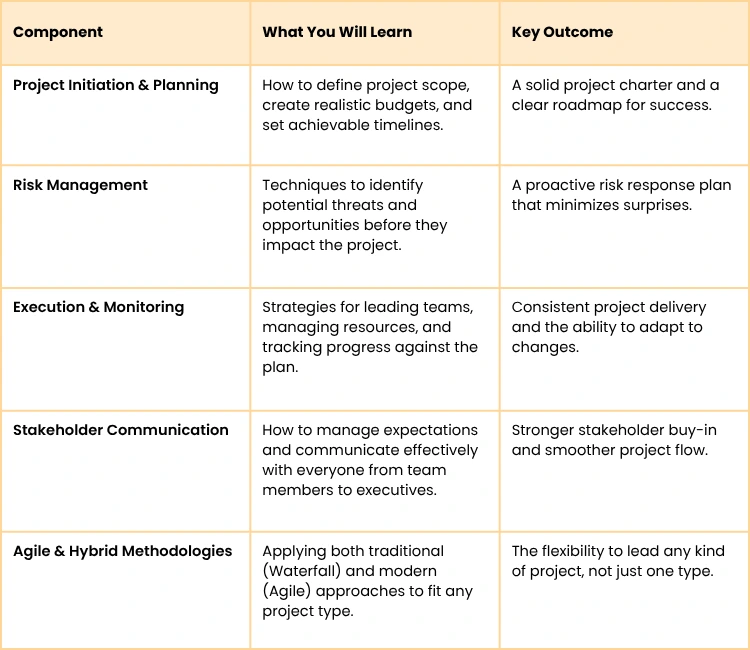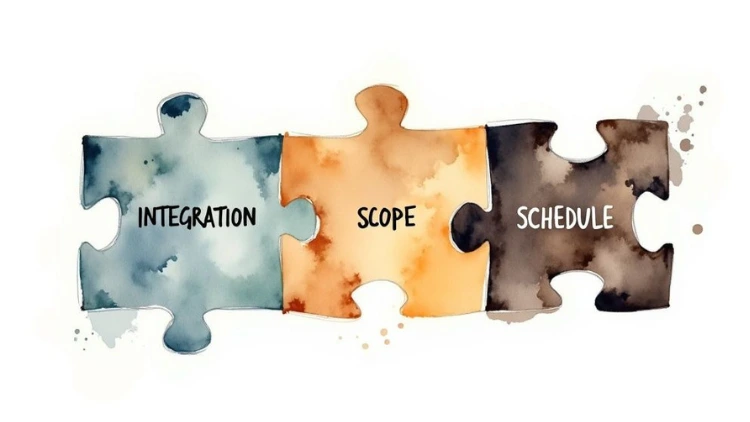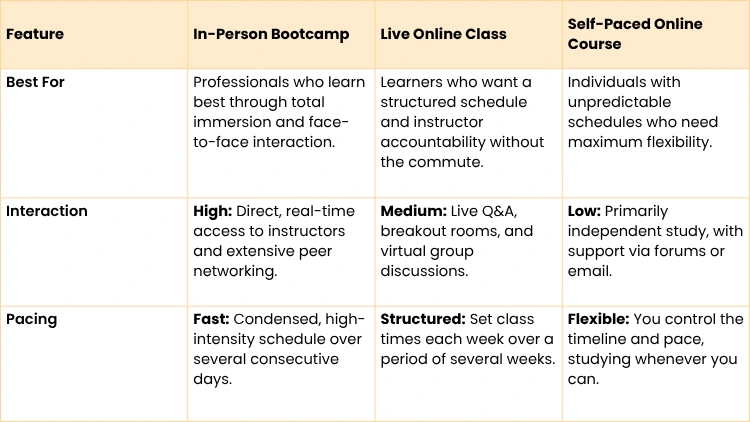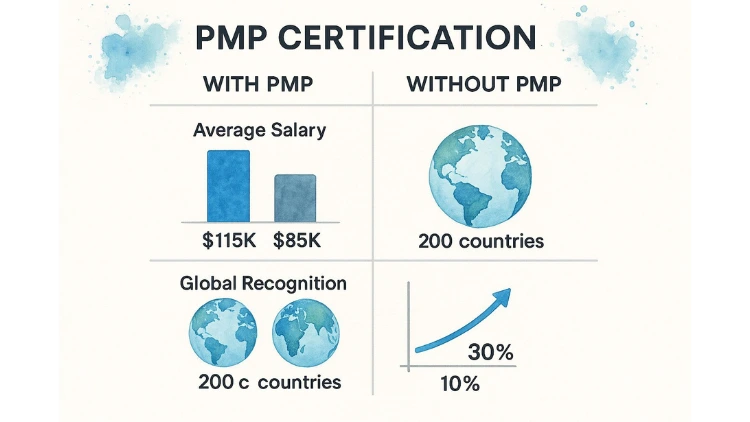Your Guide to a Project Management Professional Course

A project management professional course is the structured training that gets you ready for the globally recognized PMP certification. Think of it as a boot camp for your project management career; it gives you the battle-tested frameworks, hands-on skills, and strategic thinking required to steer complex projects from kickoff to completion.
Jump To Section

Earn As You Learn
Earn 25% commission when your network purchase Uplyrn courses or subscribe to our annual membership. It’s the best thing ever. Next to learning,
of course.
What a PMP Course Actually Teaches You
Lots of people mistake a project management professional course for just another exam cram session. And while passing the test is definitely part of the goal, the real value is in completely rewiring how you see and run projects. It’s less about memorizing jargon and more about developing a true strategic mindset.
You stop being someone who just manages a to-do list and become a leader who can anticipate roadblocks, juggle stakeholder demands, and tie every project decision back to the company's bottom line. It provides a universal language and a reliable playbook for leading projects, no matter where you are.
From Task Manager to Strategic Leader
The biggest shift you'll experience is in your perspective. You'll go from seeing a project as a simple list of tasks to understanding it as a complex, interconnected system.
- Actionable Insight: Start your next project meeting by asking, "What are the top three risks we face this week?" instead of "What's everyone working on?" This simple shift moves the conversation from status reporting to proactive problem-solving, a key PMP mindset.
- Practical Example: Imagine your team is developing a new software feature. An untrained manager might just push for a faster coding timeline. A PMP-trained manager foresees that rushing the code could lead to bugs, which will anger customers and require costly fixes later. They'll protect the timeline by negotiating a realistic scope with stakeholders, ensuring quality isn't sacrificed for speed.
A PMP course gives you a repeatable system for success, turning project chaos into a predictable process. It’s not just about finishing projects; it’s about finishing the right projects in the right way.
To give you a clearer picture, here’s a quick breakdown of what these courses cover and the outcomes you can expect.
PMP Course Components at a Glance
This table just scratches the surface, but it shows how each piece of the curriculum is designed to build a specific, practical skill that you'll use on the job.

The Global Standard for Project Leadership
The entire course is built around the principles established by the Project Management Institute (PMI). This isn't some random set of rules; it's the gold standard for project excellence recognized worldwide. As of 2025, there are roughly 1.58 million PMP-certified professionals across the globe, which tells you this credential creates a shared language of best practices that transcends industries.
Having that shared knowledge makes you an incredibly valuable and understandable leader in any organization, anywhere in the world.
Who Is the Right Fit for a PMP Course?
You might think a Project Management Professional course is only for people with "Project Manager" in their job title, but that’s a common misconception. The truth is, it’s built for anyone who finds themselves leading, directing, or managing projects, no matter what their official role is.
If your day-to-day involves coordinating tasks, juggling timelines, and keeping stakeholders in the loop, then taking a PMP course is a natural next step for your career.
The Project Management Institute (PMI) does have some specific prerequisites, but they’re not there to gatekeep. They’re designed to make sure you have enough real-world experience under your belt to truly connect with and apply what you’re learning. Think of it as a foundation—the course builds the house.
These requirements are split into two main paths.
Auditing Your Professional Experience
To get the green light, you’ll need a mix of education and actual project leadership experience. Go back through your work history and think about all the times you were responsible for any part of a project’s execution. That’s the experience that counts.
- Path 1: For Four-Year Degree Holders. You'll need 36 months of experience leading projects over the last eight years. This works out to about 4,500 hours spent directing project work.
- Path 2: For Secondary Degree Holders. If you have a high school diploma or an associate's degree, the bar is a bit higher: 60 months of project leadership experience, which is equivalent to 7,500 hours.
On top of that, both paths require 35 contact hours of formal project management training. The good news? A quality PMP course checks this box for you.
Actionable Insight: To track your experience, create a simple spreadsheet. List every project you've worked on in the last eight years. For each one, add columns for start/end dates, your role, and a brief description of your leadership responsibilities (e.g., "managed the project budget", "led daily stand-ups", "created the project schedule"). This document will become invaluable when you fill out your PMP application.
Let’s bring this to life with a practical example. Meet Alex, a software developer. For the last three years, she’s led dozens of two-week sprints, coordinated testing with the QA team, and regularly presented progress updates to stakeholders. Her title was never "Project Manager", but she was without a doubt leading project work.
To prove her eligibility, Alex can document each sprint she led and estimate how much of that time was spent on leadership tasks versus coding. By looking through her old calendars and project files, she can easily tally up her hours. You can use this exact same method to map your own background to the PMI requirements. It’s a great way to get a clear picture of whether you’re ready for a project management professional course and the career development that follows.
Diving into the PMP Course Curriculum
A Project Management Professional (PMP) course isn't just a list of topics to memorize for an exam. It’s a complete system designed to forge well-rounded leaders who can steer projects to success from every possible angle. The entire curriculum is built on three core pillars established by the Project Management Institute (PMI): People, Process, and Business Environment.
This structure ensures you become more than just a technical whiz—you become a strategic leader. Let’s break down what each of these domains really means for your day-to-day life as a project manager.
The Three Pillars of PMP Training
Getting a handle on these three areas is the key to understanding the real value of a project management professional course. Each one represents a critical skill set that modern projects absolutely demand.
- People (42% of the Exam): This is all about the human side of the equation. We're talking leadership, building a cohesive team, managing stakeholders, and resolving the inevitable conflicts. You’ll learn how to motivate your crew and communicate clearly to keep everyone rowing in the same direction.
- Process (50% of the Exam): Here’s where you get into the technical nuts and bolts of project management. This covers budgeting, scheduling, managing risks, and ensuring quality. It's about mastering the methodologies and tools needed to keep a project on track, on time, and on budget.
- Business Environment (8% of the Exam): This final pillar connects your project to the bigger corporate picture. It's about ensuring your project actually delivers business value, aligns with the company's overall strategy, and successfully navigates any compliance or governance hurdles.
Actionable Insight: After completing your next project, conduct a "Pillar Review". Ask yourself three questions: How well did I lead my people? How effective was our process? Did the outcome align with the business environment? This simple reflection helps embed the PMP framework into your everyday work.
Let's Get Practical: Building an E-commerce Site
Let’s apply this framework to a real-world scenario, like launching a new e-commerce website. The PMP curriculum trains you to see this project through all three lenses at once.
As the project manager, you would juggle:
- People: Negotiating with the marketing team (key stakeholders) on essential launch features, while also mediating disagreements between your developers and designers over the user interface.
- Process: Creating a detailed project schedule using software like Microsoft Project, setting a firm budget for development and advertising, and flagging potential risks like a server crash during a Black Friday sale. In fact, many courses show you how to plan and control your work using Microsoft Project, which is a crucial technical skill.
- Business Environment: Making sure the new website smoothly integrates with the company's existing inventory system and is designed to boost company revenue by 15% in its first year. The PMP curriculum also touches on advanced scheduling methods, and you can learn more about things like fast track project management to tighten up timelines when the pressure is on.
This balanced approach is precisely what makes PMP-certified professionals so effective—they don’t just manage the tasks, they lead the people and drive real business results.

What Are the Real-World Benefits of a PMP Certification?
Getting your PMP certification isn't just about adding another line to your resume—it's a serious investment in your career, and the returns are tangible. We're talking about a direct impact on your salary, professional credibility, and the kinds of opportunities that land on your desk.
Let's start with the most obvious perk: the money. In the United States, professionals who hold a PMP certification earn a median annual salary of around $120,000. That's a whopping 29% higher than their non-certified peers. This pay bump isn't a coincidence; it shows just how much organizations value the proven expertise a PMP brings to the table.
Boost Your Professional Credibility
Beyond a bigger paycheck, the PMP certification is a powerful seal of approval. It tells employers, recruiters, and clients that your skills aren't just self-proclaimed—they're validated against a global standard. It's an instant trust-builder that makes you stand out in a crowded job market.
Practical Example: Two candidates with similar on-the-job experience are up for a Project Director role. One has a PMP, the other doesn't. The hiring manager is more likely to choose the certified candidate because the PMP acts as a third-party endorsement, verifying their ability to handle complex projects, manage risk, and communicate effectively—reducing the hiring risk for the company.
This kind of credibility is exactly what opens doors to senior roles and leadership positions. If you're looking to climb the corporate ladder, pairing PMP training with a solid promotion strategy is a winning combination.
Gain Practical Skills That Actually Drive Value
The knowledge you pick up isn't just theoretical fluff. A huge benefit of the PMP curriculum is the focus on building strong financial acumen, including skills like calculating project ROI. This is a game-changer because it allows you to connect every project you manage directly back to the company's bottom line, proving your strategic value.
Here are a few other powerful, real-world benefits:
- A Global Network: You instantly become part of a global community with over one million PMP holders. That's an incredible network for advice, opportunities, and collaboration.
- Better Project Outcomes: Certified professionals are armed with proven frameworks that help them navigate risks and boost project success rates. This makes you an indispensable asset to any team.
- Sharpened Leadership Skills: The PMP training dives deep into communication, conflict resolution, and team motivation—the very skills that transform a good manager into a respected leader.

Choosing the Right PMP Course Format for You
Picking the right project management course isn't just a small detail—it's a major decision that can shape your entire learning experience and, ultimately, your success on the exam. The best format really comes down to you: your lifestyle, how you learn best, and what your career goals are.
There's no single "best" path for everyone. The main options you'll find are intense, in-person bootcamps; structured, live online classes; and super-flexible, self-paced online courses. Each one offers a totally different way to get a handle on the PMP curriculum.
Comparing PMP Course Formats
To figure out which one clicks for you, it helps to put them side-by-side. You'll want to think about the cost, the time you can realistically commit, and how much direct interaction you want with instructors and other students.
Here’s a quick breakdown to help you weigh the pros and cons of each PMP course format.
A live online class strikes a great balance if you're someone who thrives on group energy and needs that immediate feedback from an expert. But if you’re trying to wedge studying in between a demanding job and family life, a self-paced course gives you the freedom you need to get it done on your own terms. Diving into some best practices for distance education can also give you an edge in any flexible learning setup.
Actionable Insight: Before you enroll, take a trial lesson or watch a sample video from the course provider. This lets you test drive the instructor's teaching style and the platform's user-friendliness. A course is only as good as its ability to keep you engaged.
The numbers don't lie. PMP-certified pros often see a huge jump in salary, but it doesn't stop there. They also enjoy better job growth prospects and are recognized as experts all over the world.

Common Questions About the PMP Course and Exam
Taking the leap to get your PMP certification is a huge career move. It’s totally normal to have a few questions swirling around once you start digging into the details. After figuring out the curriculum, most people want to know about the practical side of things—the exam itself, keeping the certification active, and what it really takes to pass.
Let's clear up some of those common questions so you can map out your journey with confidence, from day one of the course to long after you’ve framed that certificate.
How Long Does PMP Certification Last?
Your PMP certification is good for three years. But don't worry, that doesn't mean you have to face that beast of an exam all over again. The Project Management Institute (PMI) has a much smarter system to keep you on top of your game.
To keep your credential active, you just need to earn 60 Professional Development Units (PDUs) during each three-year cycle. This sounds like a lot, but it’s designed to fit right into your daily work and professional growth.
Practical Example: You can earn PDUs in all sorts of ways. Leading a new project at work (up to 8 PDUs), attending an industry webinar (1 PDU per hour), mentoring a junior PM, or even volunteering your project management skills for a local nonprofit—they all count. It’s a system that makes sure a PMP certification isn’t just a one-and-done trophy, but a true mark of ongoing expertise.
PMP vs. CAPM: What Is the Difference?
Both the PMP and the Certified Associate in Project Management (CAPM) come from PMI, but they’re built for completely different people at different points in their careers. Nailing this distinction is the key to picking the right path.
Practical Example: Think of it like this: The CAPM is like getting your driver’s permit. It proves you know the theory and the rules of the road, perfect for a recent graduate who wants to show they understand project lifecycles. The PMP is like earning your commercial driver’s license—it proves you’ve got serious, hands-on experience navigating all kinds of tough conditions, like managing a multi-million dollar construction project.
The CAPM is the perfect starting block. It’s for entry-level folks, students, or team members who want to show they understand the fundamentals of project management. The PMP, on the other hand, is the gold standard for seasoned managers with a proven track record of leading projects from start to finish. In short, CAPM is about knowing the playbook; PMP is about executing it.
Does a PMP Course Guarantee I Will Pass?
A top-notch project management professional course is an incredible asset and will absolutely boost your odds of passing, but it isn't a magic wand. Think of it as a partnership: the course provides the expert guidance, but your personal dedication is what gets you over the finish line.
Actionable Insight: The most successful students create a detailed study plan and stick to it. Block out specific times on your calendar for studying, just like you would for an important meeting. Use practice exams to identify your weak areas, then dedicate extra time to those specific knowledge domains. Success isn't just about the course; it's about your disciplined approach to learning.
A good course gives you the roadmap, the tools, the practice exams, and the structured knowledge you need to tackle the material. But at the end of the day, your commitment to studying, internalizing the concepts, and putting in the work is what turns that knowledge into a passing score. The course is your expert guide, but you’re the one who has to climb the mountain.
Ready to take that next step in your project management career with a course built for real-world results? Uplyrn offers expert-led training that delivers the structure, insights, and support you need to thrive in your role. Start your journey with us today.



Leave your thoughts here...
All Comments
Reply